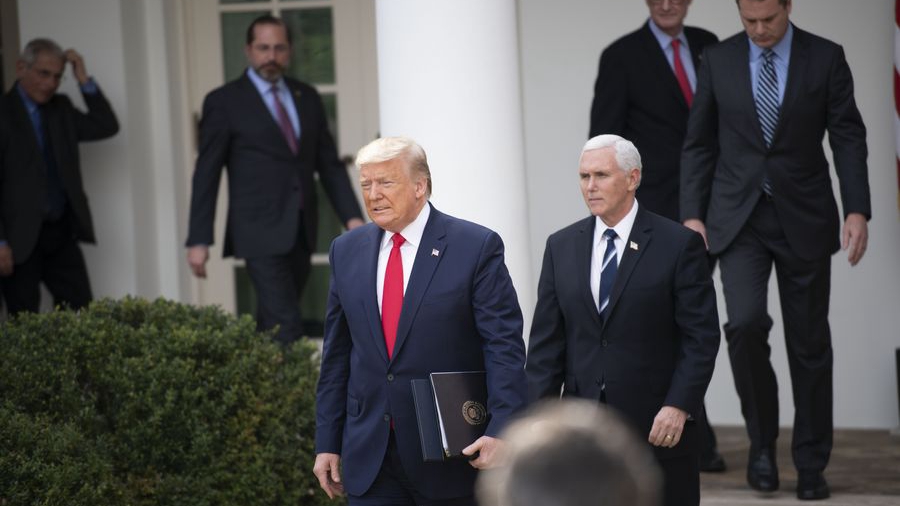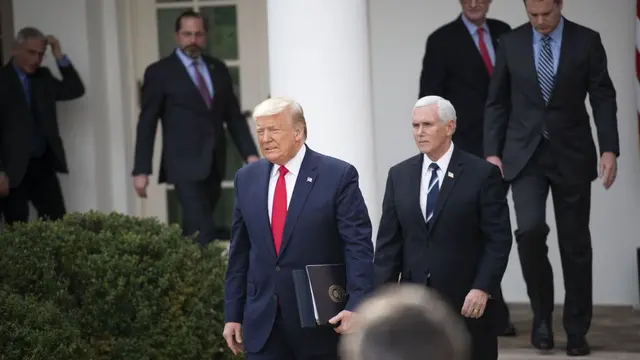
U.S. President Donald Trump (L) arrives to address a news conference at the White House in Washington, DC, the United States, March 13, 2020. /Xinhua
**Editor's note: **Mike Cormack is a writer, editor and reviewer mostly focusing on China, where he lived from 2007-2014. He edited Agenda Beijing and is a regular book reviewer for South China Morning Post. The article reflects the author's opinions, and not necessarily the views of CGTN.
"LAW ORDER!" Trump has tweeted four times since May 29. It's not unusual for him to make all-caps declarations from his Twitter account, but this concentration of messages is unusual, even for him. What's he up to?
The obvious answer is that he is referring to
the protests and riots
that have broken out across the United States following the death of George Floyd at the hands of police in Minneapolis. He has been swift to urge police and state governors to take harsh, even unconstitutional action.
For example, in a phone conference with governors on June 1 Trump said they had "to dominate, and you have to arrest people, and you have to try people and they have to go to jail for long periods of time." Otherwise, "they're going to run all over you, you'll look like a bunch of jerks." He wants to make himself appear firm, strong and decisive: the president who quelled protests and returned the nation to peacefulness.
But, transparently, Trump is playing another game with his messaging. He wants to be able to campaign in the November presidential election on the "law and order" ticket – just as Richard Nixon won the 1968 election during the last election year to feature great civil strife and racial tension.
Then, as now, civil rights campaigners were protesting racial discrimination in the United States. Then, as now, this spilled over into rioting, particularly after the assassinations of Dr. Martin Luther King, Malcolm X and Robert Kennedy. And then, as now, the response from the law enforcement agencies was heavy-handed and highly partial.
There are of course many differences between then and now: 1968 is now 52 years distant, almost two generations away. Yet it remains one of the most traumatic years in the post-Second World War American experience, a period of strife not just from the civil rights movement, but also from the U.S. involvement in Vietnam and consequent war draft, and a gaping generational divide.
In the presidential election, voters went for the Republican Richard Nixon, who campaigned among other things on restoring "law and order." This appealed to those who felt threatened by the riots and protests, the white middle-classes and suburbanites with the highest electoral turnout. A "law and order" strategy was thus more than a call for tough crime fighting, it was a racially-coded rallying cry: "Vote for me and I'll put down the uppity, criminal blacks."

U.S. President Donald Trump speaks at a press conference at the White House in Washington, DC, U.S., May 29, 2020. /Xinhua
Elections have consequences, of course. But this is true not just in the sense that they have winners and losers. They particularly also change the behavior of candidates and parties in the run-up.
With no legislative accomplishments, Trump had hoped to run on the strength of the U.S. economy – until the coronavirus pandemic destroyed that. The outbreak of protests and riots will, some might think, play into his hands. Rather than on the rubble of the economy, he will run on appearing strong at a time of national crisis.
Trump's plan is thus to follow Nixon's strategy. With his term coming to a miserable end, it is the only card left for him to play nationally. Thus, in the coming days and weeks, he will be posing in front of law enforcement officers, alongside military men, and castigating others for weakness in their handling of civil strife.
The president will do everything he can to make voting difficult for spurious national security reasons. He will pose as the tough and no-crap sheriff ready to take on some bad guys, as in the ego dream of every male brought up on Westerns and actions films.
But there is a vast and crucial difference. Trump has been President for over three and a half years. He has been the person in charge during the coronavirus, during the economic fallout, and now during the protests. In each test of leadership he has failed miserably, often seeming unaware of what his responsibilities even are, never mind attempting to live up to them.
Though, famously, Trump said "I don't take any responsibility at all", voters are not so likely to forget. Not when unemployment is at its highest since the Great Depression. Not when a pandemic killed over one hundred thousand Americans because he spent weeks claiming it was hoax, and then visibly grew bored of having to deal with it.
Elections are often a time to look ahead. Voters are very rarely grateful for the past: they want to hear how policies will benefit them going forwards. But Trump's attempt to don the mantle of lawman, here to clean up this town, will likely ring hollow: he cannot run against himself, and he cannot run away from his record. In his inaugural address, he spoke of "American carnage." Looking at present day America, that looks more likely to be the verdict on his presidency.
(If you want to contribute and have specific expertise, please contact us at [email protected].)
 简体中文
简体中文

